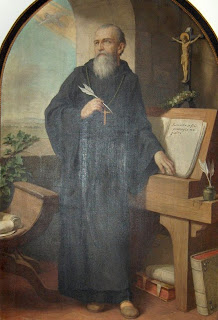Of this Saint, little is known, and almost everything there is to say about Saint Scholastica comes from the Dialogues of Saint Gregory the Great.
St. Scholastica, sister of St. Benedict, was born in Nursia (Nurcia), Italy, at around 480 AD. It is said that she was as devoted to Jesus as her brother and at such an early age she consecrated herself to a religious life. When Benedict established his monastery at Monte Cassino, Scholastica founded a Convent of Nuns in nearby Plombariola, about five miles from the Benedictines. The convent is said to have been under the direction of her brother, thus she is regarded as the first Benedictine nun.
Scholastica visited her brother once a year, but as Benedict would not allow her to enter his monastery, he would go with some of his monks to meet her at a house at some distance. There conversations were occasions spent in praising God, in conferring together on spiritual matters, and encouraging one another to a life of perfection.
St. Gregory relates a charming story of the last of these visits:
Scholastica spent the day with him in the usual practice of singing Psalms, and pious discourse followed by a frugal meal.
After it was over, Scholastica, perhaps foreknowing that it would be their last opportunity to see each other alive, asked him to delay his return till the next day and spend the evening in conversation.
St. Benedict, unwilling to break his own rule, told her he could not pass a night out of his monastery. Scholastica finding him resolved on going home, thereupon, laid her head upon the table, and prayed that God would intervene for her. Her prayer has barely ended, when the clouds broke into a storm of rain, thunder, and lightning. With such a torrential downpour, Benedict and his companions were unable to leave.
"May Almighty God forgive you, sister for what you have done," said Benedict
"I asked a favor of you," Scholastica simply replied, "and you refused it. I asked it of God, and He has granted it!"
St. Benedict was therefore obliged to comply with her request.
The next morning they parted. Three days after their last meeting, St. Scholastica died in her solitude.
At that time, Benedict was alone in contemplation on Mount Cassino. Lifting up his eyes to heaven, Benedict saw a vision of Scholastica's soul departing her body and ascending to heaven in the form of a dove. She died about the year 543, and St. Benedict followed her soon after.
Patronages:
Saint Scholastica is the patron saint of nuns, convulsive children, schools, tests, books, reading, and those suffering from storms and rain.
Prayer to Saint Scholastica:
"O God, to show us where innocence leads, you made the soul of your virgin Saint Scholastica soar to heaven like a dove in flight. Grant through her merits and her prayers that we may live in innocence and peace. We ask this through our Lord Jesus Christ, your Son, who lives and reigns with you and the Holy Spirit, one God, forever and ever. Amen."
Reflection:
* Saint Scholastica's life reminds us of the importance of spiritual relationships and the power of prayer. Her final meeting with Saint Benedict teaches us the value of cherishing time with loved ones and the profound impact of prayer. Scholastica's faith was so strong that it could change the weather, a metaphor for how faith can transform our circumstances. Her life encourages us to deepen our spiritual connections and trust in the power of prayer.
* To God nothing is too great or too trivial. He is always ready to hear the petitions and grant the desires of his people.
* When we are dependent on God, we are convinced that everything we are and have comes from Him. When we acknowledge our helplessness that’s when we turn to God with all our needs, hopes and dreams. St. Scholastica’s dependence on God is so great that only her confidence in God’s love and providence equals that.
* To God nothing is too great or too trivial. He is always ready to hear the petitions and grant the desires of his people.
* When we are dependent on God, we are convinced that everything we are and have comes from Him. When we acknowledge our helplessness that’s when we turn to God with all our needs, hopes and dreams. St. Scholastica’s dependence on God is so great that only her confidence in God’s love and providence equals that.




